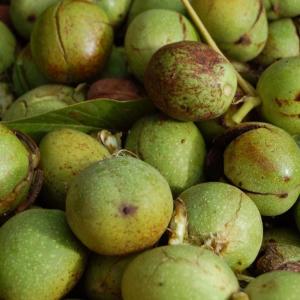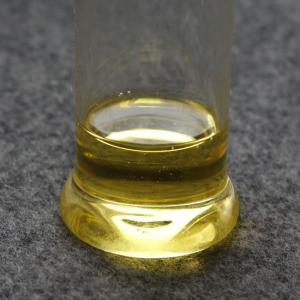
WALNUT OIL (JUGLANS REGIA) - BASE OILS

BASE / GENERAL DATA
Information submited: March 31, 2014 Modified: May 10, 2018 By: OperaDreamhouse
The Walnut tree originated from a large area going from Central Asia down to the Indian Peninsula and spread westwards to Europe and eastwards to China. Walnut, the fruit of the walnut tree (Juglans Regia), has been used in human nutrition since ancient times and walnut trees were cultivated in Europe as early as 1000 BC.
The Walnut tree is a deciduous medium-sized to tall tree that can reach up to 45 m. The fruit is spherical drupe with a green fleshy husk that opens at maturity to reveal a nut. The nut consists of a hard lignified shell containing a wrinkled kernel made up of two halves separated by a partition.
Unrefined Walnut oil is made from nuts that are dried and then cold-pressed. Good quality Walnut oil is topaz in colour with a rich nutty taste. Walnut oil is oil extracted from English Walnuts (also known as Persian Walnuts). Most Walnut oil is produced in France, though there are also producers in Australia, New Zealand and California. Walnut trees have been cultivated in Europe since Roman times for both culinary and cosmetic uses.
Walnut oil was one of the most important oils used by Renaissance painters. Its short drying time and lack of yellow tint make it a good oil paint base thinner and brush cleaner.
Chemical structure:
Walnuts are rich in phytonutrients and are an excellent source of selenium, phosphorous, magnesium, zinc, iron, and calcium.
The Walnut tree is a deciduous medium-sized to tall tree that can reach up to 45 m. The fruit is spherical drupe with a green fleshy husk that opens at maturity to reveal a nut. The nut consists of a hard lignified shell containing a wrinkled kernel made up of two halves separated by a partition.
Unrefined Walnut oil is made from nuts that are dried and then cold-pressed. Good quality Walnut oil is topaz in colour with a rich nutty taste. Walnut oil is oil extracted from English Walnuts (also known as Persian Walnuts). Most Walnut oil is produced in France, though there are also producers in Australia, New Zealand and California. Walnut trees have been cultivated in Europe since Roman times for both culinary and cosmetic uses.
Walnut oil was one of the most important oils used by Renaissance painters. Its short drying time and lack of yellow tint make it a good oil paint base thinner and brush cleaner.
Chemical structure:
Walnuts are rich in phytonutrients and are an excellent source of selenium, phosphorous, magnesium, zinc, iron, and calcium.
Walnuts and Walnut oil provide hefty levels of Vitamins B-1, B-2, and B-3, coupled with Vitamin-E and niacin.
It is about 22,2% monosaturated oleic acid, an omega-9 fatty acid, 52,9% linoleic acid, an essential polyunsaturated omega-6 fatty acid, and 10,4% alpha linolenic acid, which supplies the body with needed omega-3 fatty acids, another form of polyunsaturated fatty acid essential to human nutrition.
It is about 22,2% monosaturated oleic acid, an omega-9 fatty acid, 52,9% linoleic acid, an essential polyunsaturated omega-6 fatty acid, and 10,4% alpha linolenic acid, which supplies the body with needed omega-3 fatty acids, another form of polyunsaturated fatty acid essential to human nutrition.

SPIRITUAL PRACTISES DATA

MEDICINE / HEALTH DATA
Information submited: May 28, 2014 Modified: February 19, 2018 By: OperaDreamhouse
It has now been well established that eating Walnuts on a regular basis has definite health benefit. The most significant of which being a reduction in the risk of coronary heart disease. Adding Walnuts to the daily diet can certainly help one maintain a healthful body balance.
Walnuts and Walnut oil are also rich in antioxidants and are one of the best antioxidant sources among the tree nuts. Several medical studies have conducted research that indicates that Walnut oil offers a rich source for antioxidants, specifically ellagic acid.
Walnut oil are rich in phytonutrients and are an excellent source of selenium, phosphorous, magnesium, zinc, iron, and calcium that are helpful in stabilizing body hormones. A couple of teaspoons a day of Walnut oil can be beneficial for people suffering from the skin rashes called eczema.
Athlete's foot and Candida are some of the infections which are known to get treated with the application of Walnut oil. This oil treats psoriasis.
This oil has also high levels of polyunsaturated oils like omega - 3 and omega - 6 which help to reduce inflammation and helps prevent diseases like arthritis.
It is also associated with numerous health benefits which includes protection against heart disease, some types of cancer and slowing of the aging process (omega - 3).
This oil improves blood circulation: Walnut oil contains high levels of monounsaturated oils such as omega - 9 which help to keep your arteries supple. The flexibility of the arteries promotes the flow of blood free of any hardening leading to hyper tension and heart disease.
The cardio-protective benefits of Walnut oil are primarily due to the high concentration of alpha-linolenic acid (ALA), which is an omega-3 fatty acid that ultimately is converted to eicosapentaenoic acid (EPA), and docosahexaenoic acid (DHA), and omega - 3 fatty acids that are easily utilized by the body. The high concentration of omega - 3 fatty acids helps maintain a healthy brain.
Consumption of walnuts or Walnut oil has been shown to lower total cholesterol, LDL (bad cholesterol) and the ratio of LDL to HDL (good cholesterol). Furthermore, regular Walnut oil consumption reduced triglyceride levels 19 to 33% in a 45-day study.
Another benefit is the increase of blood levels of melatonin so assist with insomnia. Walnut oil has melatonin, which will help put your sleeping habits back in the right path.
Walnut oil is known to be a remedy to treat fungal infections.
Tones down belly fatt (Walnut oil is boosting the metabolism).
Walnuts and Walnut oil are also rich in antioxidants and are one of the best antioxidant sources among the tree nuts. Several medical studies have conducted research that indicates that Walnut oil offers a rich source for antioxidants, specifically ellagic acid.
Walnut oil are rich in phytonutrients and are an excellent source of selenium, phosphorous, magnesium, zinc, iron, and calcium that are helpful in stabilizing body hormones. A couple of teaspoons a day of Walnut oil can be beneficial for people suffering from the skin rashes called eczema.
Athlete's foot and Candida are some of the infections which are known to get treated with the application of Walnut oil. This oil treats psoriasis.
This oil has also high levels of polyunsaturated oils like omega - 3 and omega - 6 which help to reduce inflammation and helps prevent diseases like arthritis.
It is also associated with numerous health benefits which includes protection against heart disease, some types of cancer and slowing of the aging process (omega - 3).
This oil improves blood circulation: Walnut oil contains high levels of monounsaturated oils such as omega - 9 which help to keep your arteries supple. The flexibility of the arteries promotes the flow of blood free of any hardening leading to hyper tension and heart disease.
The cardio-protective benefits of Walnut oil are primarily due to the high concentration of alpha-linolenic acid (ALA), which is an omega-3 fatty acid that ultimately is converted to eicosapentaenoic acid (EPA), and docosahexaenoic acid (DHA), and omega - 3 fatty acids that are easily utilized by the body. The high concentration of omega - 3 fatty acids helps maintain a healthy brain.
Consumption of walnuts or Walnut oil has been shown to lower total cholesterol, LDL (bad cholesterol) and the ratio of LDL to HDL (good cholesterol). Furthermore, regular Walnut oil consumption reduced triglyceride levels 19 to 33% in a 45-day study.
Another benefit is the increase of blood levels of melatonin so assist with insomnia. Walnut oil has melatonin, which will help put your sleeping habits back in the right path.
Walnut oil is known to be a remedy to treat fungal infections.
Tones down belly fatt (Walnut oil is boosting the metabolism).

BEAUTY / COSMETICS DATA
Information submited: May 28, 2014 Modified: March 2, 2018 By: OperaDreamhouse
Suitable for dry, normal, mature and oily skin types.
Walnut oil is a very good antioxidant and helps fight aging really well. It is extremely good for aging skin. Walnut oil is used to treat dry skin and is a key ingredient in many anti-wrinkle and anti-aging products.
The oil has great emollient qualities and often used as a blend by masseurs. It is used to regenerate and moisturise damaged skin.
Use a small amount of this eye cream to protect and nourish the delicate under-eye area. It is also used as a sunbathing oil as it protect the skin from UV damage and enhances tanning.
It shares several of the same benefits as other nut-based hair oils, such as cleaning the scalp, moisturizing hair, preventing hair loss while encouraging growth, and keeping strands stronger and healthy.
Walnut oil may also help to make the hair color appear more vibrant and lustrous. It is believed that the Walnut oil cleans the scalp of excess dirt, sweat and dead skin cells. This also helps to prevent dandruff, also known as seborrheic dermatitis. Walnut oil also contains antifungal properties that are believed to combat several infections that may affect the scalp and cause hair loss.
The high concentration of omega - 3, omega - 6 and omega - 9 also help to prevent balding by strengthening the hair follicles. The application of Walnut oil for hair cleansing also suggests it may be effective in removing signs of cradle cap in infants.
Walnut oil is a very good antioxidant and helps fight aging really well. It is extremely good for aging skin. Walnut oil is used to treat dry skin and is a key ingredient in many anti-wrinkle and anti-aging products.
The oil has great emollient qualities and often used as a blend by masseurs. It is used to regenerate and moisturise damaged skin.
Use a small amount of this eye cream to protect and nourish the delicate under-eye area. It is also used as a sunbathing oil as it protect the skin from UV damage and enhances tanning.
It shares several of the same benefits as other nut-based hair oils, such as cleaning the scalp, moisturizing hair, preventing hair loss while encouraging growth, and keeping strands stronger and healthy.
Walnut oil may also help to make the hair color appear more vibrant and lustrous. It is believed that the Walnut oil cleans the scalp of excess dirt, sweat and dead skin cells. This also helps to prevent dandruff, also known as seborrheic dermatitis. Walnut oil also contains antifungal properties that are believed to combat several infections that may affect the scalp and cause hair loss.
The high concentration of omega - 3, omega - 6 and omega - 9 also help to prevent balding by strengthening the hair follicles. The application of Walnut oil for hair cleansing also suggests it may be effective in removing signs of cradle cap in infants.

FOOD / COOKING DATA
Information submited: May 28, 2014 Modified: February 19, 2018 By: OperaDreamhouse
Walnut oil is edible and is generally used less than other oils in food preparation, often due to high pricing. Shelf life is 6 month.
It is light-coloured and delicate in flavour and scent, with a nutty quality. Walnut oil has a rich, nutty flavor that is perfect for salad dressings, to flavor fish and steaks, to toss with pasta, and to jazz up desserts.
Although chefs sometimes use Walnut oil for pan frying, most avoid walnut oil for high temperature cooking; heating tends to reduce the oil's flavour and nutritive value and to produce a slight bitterness. In addition cooking rapidly destroys the oil's antioxidants. Walnut oil is at its most valuable in cold dishes, where it lends its flavour to best advantage.
Walnut oil to a chicken or turkey salad along with some grapes and chopped walnuts. Brush a thin coat of Walnut oil on grilled fish and steaks just before serving. Toss freshly cooked pasta in a mixture of Walnut oil and spices.
It is light-coloured and delicate in flavour and scent, with a nutty quality. Walnut oil has a rich, nutty flavor that is perfect for salad dressings, to flavor fish and steaks, to toss with pasta, and to jazz up desserts.
Although chefs sometimes use Walnut oil for pan frying, most avoid walnut oil for high temperature cooking; heating tends to reduce the oil's flavour and nutritive value and to produce a slight bitterness. In addition cooking rapidly destroys the oil's antioxidants. Walnut oil is at its most valuable in cold dishes, where it lends its flavour to best advantage.
Walnut oil to a chicken or turkey salad along with some grapes and chopped walnuts. Brush a thin coat of Walnut oil on grilled fish and steaks just before serving. Toss freshly cooked pasta in a mixture of Walnut oil and spices.
COMMENTS
No comments.












